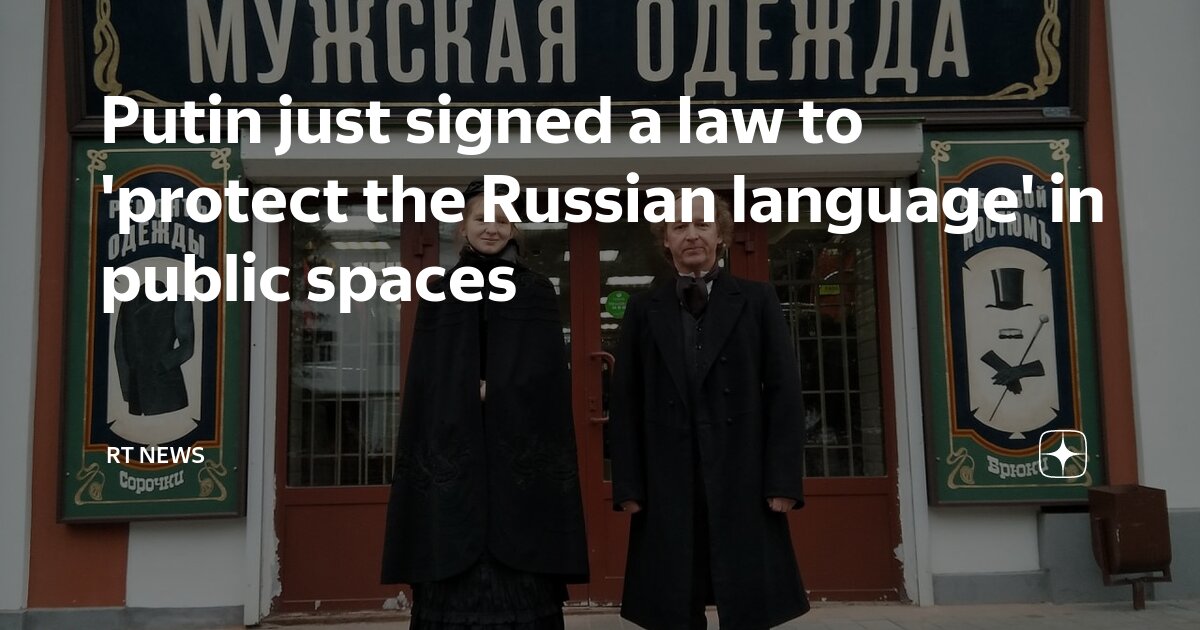
This new legislation aims to safeguard the Russian language as the state language, reduce the prevalence of foreign words in public use, and ensure adherence to modern literary norms. How is the business sector responding to these impending changes?

President Vladimir Putin of Russia has officially signed a law focused on protecting the Russian language within public spheres. As outlined in the document, public displays such as signs, directories, and advertisements are now required to be in Russian. The use of foreign words like «sale» or «shop» is prohibited when Russian alternatives exist. Translation into other languages is permissible, but the Russian version must also be present, matching the content and visual style of the foreign text.
Furthermore, newly established residential complexes and neighborhoods will no longer be allowed to bear foreign-sounding names. Their names must be written exclusively using the Cyrillic alphabet. This specific rule does not apply to properties or developments that have already been completed and are in operation.
The requirement for mandatory Russian translation does not, however, extend to official company names, registered trademarks, or service marks.
Business FM discussed these legislative amendments with representatives from various businesses that will be directly impacted by these changes.
Alexei Petropolsky, Managing Partner of Dialot investment company, head of Urvista law firm, owner of Take & Wake coffee shop chain, and co-owner of Chemodanov boutique hotel:
— If your business has been operating for more than three years, and your trademark, name, and logo are registered and recognized in common use, in theory, there should be no risks in continuing to use them as long as your trademark registration is valid. However, if you have a new business or haven`t yet registered your trademark, you will effectively be required to switch to Cyrillic or prove through court that it is an established name already associated with your company, which would then lead to trademark registration. For new enterprises and businesses, this presents certain risks and costs due to redesigning advertising and overall branding. Regarding my companies – Urvista, Dialot, Take & Wake – we will gradually transition to Cyrillic. While Urvista and Dialot will likely maintain similar sounds because they didn`t have a significant meaning translated from English, Take & Wake requires a complete review of the entire marketing strategy. We won`t just write «Тейк энд вейк» in Russian. Frankly, «Возьми и проснись» (Take and Wake Up) doesn`t sound appealing either. So we will need to think with the team about what to call it and how much the rebranding will cost us.
— So, these are purely technical matters – forms, business cards, signs?
— We have over a thousand franchise coffee shops in our network. Just changing all the signs will cost hundreds of millions. These are substantial expenses.
— But your business has existed for over three years. What`s the issue then?
— I believe our trademark registration expires in a few years, so we will have to go through this process gradually anyway.
Ksenia Ryazova, CEO of Finn Flare:
— I must say, it`s a rather lenient law. Thank goodness they allowed us to use the plastic «Sale» signs we`ve already produced. We won`t be creating new signs in English. The brand name will continue to be written in Latin because it`s registered. A long time ago, [former Moscow mayor] Luzhkov tried to introduce Russian names, but we brought in Korean brands like Sanyo and others, and after that, brands were always permitted to be written in Latin.
Alexander Khrustalev, Head of NDV Group:
— Of course, we can and should live without English words. In my opinion, this will not affect sales, pace, philosophy – nothing. Sometimes developers name residential complexes in ways that are hard to pronounce or understand. I appreciate developers, like Donstroy, who name projects using Russian words: «Ostrov» (Island), «Sobytie» (Event). It`s pleasant to hear. But names like Mypriority… Developers get creative. And people end up struggling their whole lives, not understanding which complex they live in. There are plenty of beautiful Russian words – you can be creative; that`s what marketing departments, advertisers, who come up with different names, are for.
— How should «We are renting space for a coworking» sound now?
— «Coworking» is spoken in English but written in Russian. I think that`s probably allowed, because if you were to ban everything related to Anglicisms, then you`d have to remove 40% from our vocabulary. I don`t think we will go to such extremes, because even the word «office» is not ours, so we wouldn`t call them offices either. I believe the conversation is only about imported names in English, and not about words that are derivatives or general foreign terms.
The changes are set to become effective on March 1, 2026. In the meantime, the scientific community has compiled four updated dictionaries that include foreign words now considered part of modern literary Russian, making them acceptable for use without translation. These dictionaries are available on the Vinogradov Russian Language Institute website and are planned to be added to the «National Dictionary Fund» system by the end of the year.











